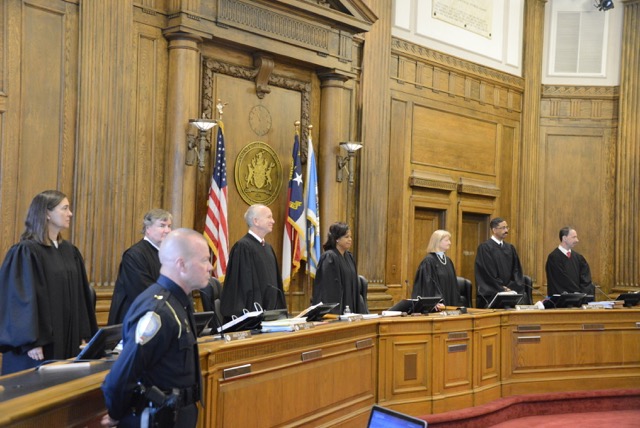The North Carolina Supreme Court met for the first time in Greensboro on Monday, Nov. 18.
As part of its bicentennial celebration, the NC Supreme Court received permission from the North Carolina General Assembly to meet somewhere other than Raleigh, Edenton and Morganton – the only three cities in the state that by law the state Supreme Court could hold court.
About 50 people – as one might guess, mostly attorneys – gathered for the proceedings. Greensboro was the first stop on the tour and the NC Supreme Court will also meet in Hillsborough and Smithfield.
No reason was given for Greensboro being chosen as the first stop on the tour, but two of the seven justices have Greensboro connections – Justice Paul Newby, who grew up in Jamestown and is a graduate of Ragsdale High School, and Justice Robin Hudson, who is a graduate of Page High School.
There were two sessions and Newby spoke briefly before the first session about his experiences growing up in the area and the career path that led him to his present position as the senior associate Supreme Court justice.
Before the second session, Hudson spoke about her experiences going to Page and then to Yale and law school at UNC-Chapel Hill and her last election where she had to deal with vicious attacks on her character.
The NC Supreme Court heard both a civil and a criminal case with Chief Justice Cheri Beasley presiding. The civil case was heard first and had a Greensboro connection. The case, Chambers v. Moses Cone Hospital, was on its face pretty simple and completely understandable to anyone who has had to actually pay a medical bill in the past decade or so.
Chambers had an emergency appendectomy at Cone Hospital and had no insurance. He had to pay his own bill and believed he was overcharged. He sued Cone on behalf of all the other people without insurance who were charged a higher rate than what the insurance companies pay. Then it got complicated because Cone cancelled his bill and said, because he could not claim damages he couldn’t sue. His attorney argued that it was still a class action lawsuit. Cone’s attorney argued that it wasn’t, but it was far more complicated.
The only indication of which way the court is leaning is in the questions that the justices ask, and the justices do not hesitate to ask questions and lead the attorneys down some paths it appeared they didn’t anticipate going.
The second case was criminal, the State of North Carolina v Jeffrey Tryon Collington, and was a question of whether an attorney could be deemed to have provided “ineffective assistance” because he didn’t follow his own argument to the end, or that’s the way it sounded to an observer without a legal education.
The state didn’t take the time allotted for rebuttal, which to at least one observer seem to indicate that the attorney representing the state thought she was ahead and didn’t need to subject herself to anymore questions.

